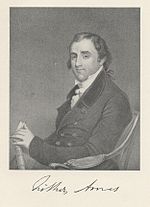Henry Phillips (politician)
| Part of a series on the |
| History of Dedham |
|---|
 |
| Main article |
| Dedham, Massachusetts |
| By year |
| By topic |
Henry Phillips (died 1685[1]) was a wealthy businessman and politician from Boston and Dedham, Massachusetts. Phillips was described as "tender and brokenhearted."[2]
Life in Dedham
Phillips moved from Boston to Dedham in 1637,[1] two years after the town was first settled and one year after it was incorporated. He was a member of the church and a militia officer.[1] Though he received "better than average" dividends of land,[1] he complained in 1656 that too many people had been admitted to the town commons, diluting the value of his interest.[3] He led a group of dissatisfied settlers in a rare public complaint.[4][1] He brought his complaint before the General Court, which was an action even more rare in a community whose covenant called for disputes to be resolved by local mediation.[5] He served one term as selectman in 1645.[6] He briefly owned the land that came to be known as Broad Oak.[7]
Life in Boston
Upset about the distribution of land, Phillips returned to Boston in 1656.[1] There he became a deacon at First Church in Boston and a delegate to the Great and General Court of Massachusetts.[1] He also worked as a butcher.[1] His death in 1685 was mentioned in Samuel Sewall's diary.[1]
References
- ^ a b c d e f g h i Lockridge 1985, p. 60.
- ^ Lockridge 1985, p. 31.
- ^ Lockridge 1985, pp. 9–10.
- ^ Lockridge 1985, p. 15.
- ^ Lockridge 1985, pp. 82–83.
- ^ Worthington 1827, p. 79-81.
- ^ Richards, Arthur Wescate (1942). Genealogy: the James Francis Richards branch of a Richards family of New England; that of Edward Richards, Dedham, Massachusetts, 1635-1684. Sarasota, Florida: Star Printing Company. p. 16.
Works cited
- Lockridge, Kenneth (1985). A New England Town. New York: W.W. Norton & Company. ISBN 978-0-393-95459-3.
{{cite book}}: Invalid|ref=harv(help)
- Worthington, Erastus (1827). The history of Dedham: from the beginning of its settlement, in September 1635, to May 1827. Dutton and Wentworth. Retrieved November 8, 2019.
